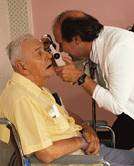(HealthDay)—For older Medicare beneficiaries, having a disorder of binocular vision is associated with increased odds of musculoskeletal injury, fracture, and fall, according to a study published in the January issue of JAMA Ophthalmology.
Stacy L. Pineles, M.D., from the University of California in Los Angeles, and colleagues conducted a retrospective 10-year study (2002 to 2011) to examine the associations between disorders of binocular vision and musculoskeletal injury, fracture, or fall prevalence. Participants included 2,196,881 community-dwelling Medicare beneficiaries who were aged 65 years or older and had at least one year of Medicare Part B enrollment.
The researchers found that 4.5 percent of participants had at least one disorder of binocular vision (strabismus, 2.3 percent; diplopia, 2.2 percent; amblyopia, 0.9 percent; and nystagmus, 0.2 percent). There were 57.9 percent of patients with documented musculoskeletal injury, fracture, or fall during the 10-year study period. For the association between disorders of binocular vision and any of these injury types, the unadjusted odds ratio was 2.23 and the adjusted odds ratio was 1.27 (both P < 0.001).
"This finding is an important step forward in understanding and developing strategies to prevent these injuries, which are associated with high morbidity in the elderly," the authors write.
More information:
Abstract
Full Text (subscription or payment may be required)
Journal information: JAMA Ophthalmology
Copyright © 2015 HealthDay. All rights reserved.




















